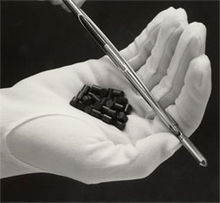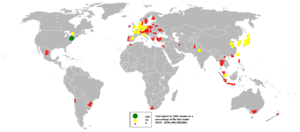- Fuel
-
 Wood was one of the first fuels used by humans and is still the primary energy source in much of the world.[citation needed]
Wood was one of the first fuels used by humans and is still the primary energy source in much of the world.[citation needed]
Fuel is any material that stores energy that can later be extracted to perform mechanical work in a controlled manner. Most fuels used by humans undergo combustion, a redox reaction in which a combustible substance releases energy after it ignites and reacts with the oxygen in the air. Other processes used to convert fuel into energy include various other exothermic chemical reactions and nuclear reactions, such as nuclear fission or nuclear fusion. Fuels are also used in the cells of organisms in a process known as cellular respiration, where organic molecules are oxidized to release usable energy. Hydrocarbons are by far the most common source of fuel used by humans, but many other substances, such as radioactive metals, are currently used as well .
Contents
Chemical
Chemical fuels are substances that release energy by reacting with substances around them, most notably by the process of oxidation.
Biofuels
Biofuel can be broadly defined as solid, liquid, or gas fuel consisting of, or derived from biomass. Biomass can also be used directly for heating or power—known as biomass fuel. Biofuel can be produced from any carbon source that can be replenished rapidly e.g. plants. Many different plants and plant-derived materials are used for biofuel manufacture.
Perhaps the earliest fuel employed by humans is wood. Evidence shows controlled fire was used up to 1.5 million years ago at Swartkrans, South Africa. It is unknown which hominid species first used fire, as both Australopithecus and an early species of Homo were present at the sites.[1] As a fuel, wood has remained in use up until the present day, although it has been superseded for many purposes by other sources. Wood has an energy density of 10–20 MJ/kg.[2]
Recently biofuels have been developed for use in automotive transport (for example Bioethanol and Biodiesel), but there is widespread public debate about how carbon efficient these fuels are.
Fossil fuels
Fossil fuels are hydrocarbons, primarily coal and petroleum (liquid petroleum or natural gas), formed from the fossilized remains of ancient plants and animals[3] by exposure to high heat and pressure in the absence of oxygen in the Earth's crust over hundreds of millions of years.[4] Commonly, the term fossil fuel also includes hydrocarbon-containing natural resources that are not derived entirely from biological sources, such as tar sands. These latter sources are properly known as mineral fuels.
Nuclear
Nuclear fuel is any material that is consumed to derive nuclear energy. Technically speaking this definition includes all matter because any element will under the right conditions release nuclear energy, the only materials that are commonly referred to as nuclear fuels though are those that will produce energy without being placed under extreme duress.
Fission
The most common type of nuclear fuel used by humans is heavy fissile elements that can be made to undergo nuclear fission chain reactions in a nuclear fission reactor; nuclear fuel can refer to the material or to physical objects (for example fuel bundles composed of fuel rods) composed of the fuel material, perhaps mixed with structural, neutron moderating, or neutron reflecting materials. The most common fissile nuclear fuels are 235U and 239Pu, and the actions of mining, refining, purifying, using, and ultimately disposing of these elements together make up the nuclear fuel cycle, which is important for its relevance to nuclear power generation and nuclear weapons. In addition there various types of fuels.
Fusion
Fuels that produce energy by the process of nuclear fusion are currently not utilized by man but are the main source of fuel for stars, the most powerful energy sources in nature. Fusion fuels tend to be light elements such as hydrogen which will combine easily.
In stars that undergo nuclear fusion, fuel consists of atomic nuclei that can release energy by the absorption of a proton or neutron. In most stars the fuel is provided by hydrogen, which can combine together to form helium through the proton-proton chain reaction or by the CNO cycle. When the hydrogen fuel is exhausted, nuclear fusion can continue with progressively heavier elements, although the net energy released is lower because of the smaller difference in nuclear binding energy. Once iron-56 or nickel-56 nuclei are produced, no further energy can be obtained by nuclear fusion as these have the highest nuclear binding energies.[5]
World trade
World Bank reported that the USA was the top fuel importer in 2005 followed by the EU and Japan.[citation needed]
Use over time
The first use of fuel was the combustion of wood or sticks by Homo erectus near 2 million years ago.[6][page needed] Throughout the majority of human history fuels derived from plants or animal fat were the only ones available for human use. Charcoal, a wood derivative, has been used since at least 6,000 BCE for smelting metals. It was only supplanted by coke, derived from coal, as the forests started to become depleted around the 18th century. Charcoal briquettes are now commonly used as a fuel for barbecue cooking.[7]
Coal was first used as a fuel around 1000 BCE in China. With the development of the steam engine in 1769, coal came into more common use as a power source. Coal was later used to drive ships and locomotives. By the 19 th century, gas extracted from coal was being used for street lighting in London. In the 20th century, the primary use of coal is for the generation of electricity, providing 40% of the world's electrical power supply in 2005.[8]
Humans have been consuming fossil fuels since the industrial revolution, because they were more readily available then the existing standards such as whale oils, and they were much cheaper to produce.
Currently the trend has been towards renewable fuels, such as biofuels like alcohols.
See also
- Alcohol fuel
- Alternative fuels
- Ammonia
- Battery (electricity)
- Bitumen-based fuel
- Cryogenic fuel
- Fuel cell
- Fuel oil
- Fuel card
- Fuel management systems
- Fuel poverty
- Hydrogen economy
- Hydrogen fuel
- Liquid fuels
- List of energy topics
- Marine fuel management
- Propellant
- recycled fuel
- Solid fuel
- World energy resources and consumption
Footnotes
- ^ Rincon, Paul (2004-03-22). "Bones hint at first use of fire". BBC News. http://news.bbc.co.uk/1/hi/sci/tech/3557077.stm. Retrieved 2007-09-11.
- ^ Elert, Glenn (2007). "Chemical Potential Energy". The Physics Hypertextbook. http://hypertextbook.com/physics/matter/energy-chemical/. Retrieved 2007-09-11.
- ^ Dr. Irene Novaczek. "Canada's Fossil Fuel Dependency". Elements. http://www.elements.nb.ca/theme/fuels/irene/novaczek.htm. Retrieved 2007-01-18.
- ^ "Fossil fuel". EPA. Archived from the original on 12 March 2007. http://web.archive.org/web/20070312054557/http://oaspub.epa.gov/trs/trs_proc_qry.navigate_term?p_term_id=7068&p_term_cd=TERM. Retrieved 2007-01-18.
- ^ Fewell, M. P. (1995). "The atomic nuclide with the highest mean binding energy". American Journal of Physics 63 (7): 653–658. Bibcode 1995AmJPh..63..653F. doi:10.1119/1.17828.
- ^ Leakey, Richard (1994). Origin of Humankind. Basic Books. ISBN 0465031358. http://books.google.com/?id=75-cwH1905QC&pg=PR9&dq=%22first+use+of+Fire%22.
- ^ Hall, Loretta (2007). "Charcoal Briquette". How Products Are Made. http://www.madehow.com/Volume-4/Charcoal-Briquette.html. Retrieved 2007-10-01.
- ^ "History of Coal Use". World Coal Institute. http://www.worldcoal.org/pages/content/index.asp?PageID=107. Retrieved 2006-08-10.
yooo
References
- Ratcliff, Brian et al. (2000). Chemistry 1. Cambridge University press. ISBN 0-521-78778-5.
Further reading
- Directive 1999/94/EC of the European Parliament and of the council of 13 December 1999, relating to the availability of consumer information on fuel economy and CO2 emissions in respect of the marketing of new passenger carsPDF (140 KiB).
- Council Directive 80/1268/EEC Fuel consumption of motor vehicles.
Categories:- Fuels
- Energy development
Wikimedia Foundation. 2010.


